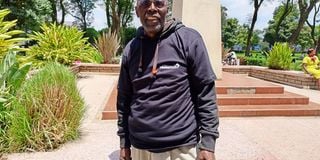How Kenya’s constitution transformed Nyayo Gardens from a battleground into a forum for freedom

David Kuria, a Nakuru based human rights activist during an interview on August 27, 2025.
I sat with David Kuria, a human rights activist based in Nakuru, on one of the benches in Nyayo Gardens. For a few seconds, we simply observed the hustle and bustle of activity in the gardens.
Various civic education talks and events were taking place within the gardens, as residents participated in the commemoration of the Constitution's 15th anniversary.
His face loses its blissful expression as he recalls a time in Nakuru when holding such forums was almost illegal, and hired thugs carrying clubs would storm into the gardens and beat people in an effort to disperse them.
"Believe it or not, there was a time in Nakuru when holding any assembly that shed light on or created awareness of matters of governance was prohibited," says the human rights activist.
For example, in the 1990s, they held a meeting at the Lions Gardens, which was disrupted by KANU youth wingers.
"In the early 90s, I was involved in exposing corruption within the KANU youth wing in Nakuru. We fought for the rights of a group of mothers whose sons had been jailed by the KANU regime. We would hold our meetings at the Lions Gardens. One time, while we were in the middle of a meeting, the KANU youth wingers stormed in and chased us away with whips,” he says.
Mr Kuria claims that all these atrocities happened under the watchful eye of the police.
"During that period, the KANU youth wingers ran Nakuru. They extorted and harassed businesspeople and demanded bribes, as well as harassing residents at every turn. I remember being vocal about this issue at one point, which resulted in me spending three weeks at Nakuru Central Police Station, despite never being charged with any offence,” he says.
However, a smile emerges on his face as he begins to explain what the promulgation of the new constitution meant to him and to activists in Nakuru.
“For me, Kenya's new constitution was like a ray of sunshine in an otherwise dark world. From the bill of rights to addressing issues of governance, these were all things that we had spent the better part of 20 years fighting for, and now we had them,” he notes.
“Fifteen years later, I can say that some things have changed. For example, there is now a legal requirement to present someone in court within 24 hours of arrest. I remember spending a month in jail without being taken to court, so this is a major milestone,” he says.
In those days, freedom of expression, assembly and picketing didn't exist. We've witnessed many protests in the past two years, from GEN Z's anti-finance bill protests to femicide walks. All of these were unheard of.
But the constitution now guarantees and protects all those who want to make their voices heard.
However, he notes that the struggle to realise the constitution's full potential is ongoing, as there are those who seek to undermine it.
"When you hear leaders saying that peaceful protesters should be shot in the legs, this sends out a very different message to that set out in the constitution. These are tactics that, one way or another, could return us to the dark days of this country,” he says.
According to Mr Kuria some progress has been made, but there is still a long way to go.


